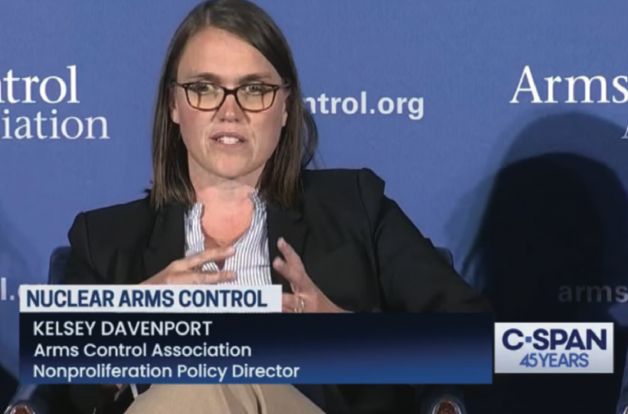Inside the Arms Control Association
October 2024
Navigating the Road Ahead
Early voting has already begun and millions of American voters will register their choices at the ballot box by November 5.
The outcome of the 2024 election will have far-reaching impacts on a wide range of issues that concern all of us, including the growing dangers posed by nuclear weapons.
Whatever the outcome of the presidential and congressional races may be, the Arms Control Association team is poised to take action to help:
- Reinforce the norms against nuclear weapon use, nuclear threats, nuclear testing, and the spread of nuclear weapons.
- Head-off an unconstrained, costly, counterproductive, and dangerous three-way arms race involving the United States, Russia, and China.
- Jumpstart the dialogue between major nuclear-armed states on risk reduction and arms control.
Through the years, the Arms Control Association has demonstrated that we can effectively address pressing nuclear challenges with an impact disproportionate to our modest size and lean budget.
We’re already hard at work, so we are ready to hit the ground running in 2025 and deal with whatever may be awaiting on the road ahead:
- Last week, ACA organized a private letter from a group of former officials and nuclear policy experts urging President Biden to deliver, for the first time during his presidency, a major address outlining his vision for how the United States can effectively work to reduce the most urgent threats posed by nuclear weapons.
- On Nov. 8, the ACA Board of Directors will meet to assess the election results and update the organization’s public education and policy advocacy plan of action for the coming year and beyond.
- We also plan to forward our recommendations to the presidential transition team on some of the key nuclear-policy decisions that will need to be made in the first 100 days.
- Later in November, we will also continue our discussions with congressional leaders, including members of the bicameral Nuclear Weapons and Arms Control Working Group, about how to update legislation and activities aimed at building a bipartisan opposition to any threats of nuclear weapon use and support smarter U.S.-led arms control diplomacy.
- In early-December, ACA, in partnership with the Nuclear Threat Initiative and with a grant from the Prospect Hill Foundation, will convene a special strategy retreat for a group of 40 key leaders and campaigners from a wide range of nuclear arms control and disarmament partner organizations. One goal will be to identify common strategic goals and facilitate more effective joint action to build public awareness and pressure for effective measures that reduce nuclear dangers.
The domestic and geopolitical landscape is certainly filled with a mind-blowing array of challenges.
But when it comes to facing down the threat of nuclear weapons, history shows we are stronger and more effective when we are pulling in the same direction. That’s why the ACA team will continue to provide leadership and will work in partnership with a diverse range of organizations and allies who also want to reduce the nuclear danger.
And it is why we need your help and financial support for ACA’s critical contributions to advance saner nuclear weapons policies.
The Significance of the 2024 Nobel Prize for Peace
Earlier this month, Nihon Hidankyo (the Japan Confederation of A & H Bomb Sufferers) was recognized by the Norwegian Nobel Peace Prize Committee for persistent efforts on behalf of the Hibakusha to move closer to the peace and security of a world free of nuclear weapons.
“The Nobel Peace Prize award to the Hibakusha in this, the 80th anniversary year of the U.S. atomic attacks on the people living in the cities of Hiroshima and Nagasaki, serves as a reminder of the devastating human impacts of nuclear weapons use, nuclear weapons development and production, nuclear testing, and the risk of a global thermonuclear war,” said Shizuka Kuramitsu, ACA research assistant, and native of Hiroshima, in our Oct. 11 press release congratulating the Nihon Hidankyo on its Nobel Peace Prize.

“As we approach the 80th anniversary of the atomic bombings of Hiroshima and Nagasaki, human civilization remains precariously tethered to the existence of nuclear weapons and the threat they might be used again,” Kuramitsu cautioned.
“Government leaders, including Japan’s leaders, should take this opportunity to contribute more to necessary efforts to advance nuclear disarmament, provide more support for research of nuclear effects, and provide more assistance for victims and survivors of nuclear weapons use and nuclear testing,” Kuramitsu stated.
The award ceremony will be held in Oslo on Dec. 10. Further details on the 2024 award are available through the Nobel Peace Prize Committee website.
And look for our news coverage on the 2024 Nobel Peace Prize and other arms control-related developments in the forthcoming November issue of Arms Control Today.
ACA Warns That Strikes on Iranian Nuclear Facilities Would Be Counterproductive
On Oct. 1, Iran launched a major ballistic missile attack against Israel in response to Israel's bombardment of targets in Lebanon, its assassination of Hezbollah leaders, and its rejection of international appeals for a ceasefire in Gaza. Israel has vowed that it will retaliate.
Some politicians and pundits are now urging Israel and the United States to retaliate with strikes on Iran’s nuclear facilities, a move that the Biden administration has publicly opposed.
In an Oct. 2 statement, in subsequent media interviews, and in consultations with congressional offices and senior diplomats, ACA experts have warned that further escalation, particularly retaliatory strikes against Iranian nuclear infrastructure, would be counterproductive and would likely push Tehran to develop nuclear weapons.
“Iran already has the knowledge necessary to build a nuclear explosive device—that knowledge cannot be bombed away. Any setback in Iran’s nuclear capabilities would be temporary and would likely lead Iran to rebuild its program and further harden its facilities against future attacks. More concerningly, military strikes could push Iran to withdraw from the nuclear Nonproliferation Treaty and pursue nuclear weapons,” said ACA director for nonproliferation policy Kelsey Davenport.

“A nuclear-armed Iran is not inevitable—despite the country advancing to the threshold of nuclear weapons in the aftermath of the Trump administration's decision to unilaterally back out of the 2015 nuclear deal, or Joint Comprehensive Plan of Action (JCPOA). But the risk of Iran pursuing a nuclear weapon will increase if conflict intensifies,” our statement concludes.
Constraining Iran’s nuclear potential in the absence of the JCPOA is exceedingly difficult. But Tehran’s new president has signaled its willingness to de-escalate tensions over its nuclear program that we believe U.S. leaders can and must explore.
Through our contacts, ACA will continue to advance practical options that can incentivize Tehran to take steps that increase monitoring of its nuclear program and reduce the risk that Iran might join Israel to become the second nuclear-armed state in the region.
Pressing for Compliance with U.S. Arms Transfer Policy and Law
This week, the Arms Control Association joined a coalition of over 110 organizations calling on Congress to pass joint resolutions of disapproval and block arms sales to Israel, due to the fact that U.S.-made weapons are being used by Israeli Defense Forces in Gaza and Lebanon in a manner that violates U.S. policies and laws designed to protect civilians.
The joint resolutions of disapproval would suspend particular transfers of types of weapons that the Israeli government has used in strikes that have killed thousands of civilians, including aid workers and journalists, in Gaza over the last year.
Independent human rights and conflict monitors have thoroughly documented the Israeli military’s use of weapons from the United States in attacks that have killed Palestinian civilians.
President Biden has described Israeli government attacks as “indiscriminate.” The U.S. government, UN agencies, and the Israeli government itself have documented that Israeli Defense Forces have systematically impeded the flow of emergency aid to civilians caught up in the conflict.
As ACA and others have argued in the past, the joint letter notes that U.S. law, regulations, and the Biden administration’s own Conventional Arms Transfer policy require withholding military assistance when U.S.-supplied weapons transfers are used contrary to international humanitarian law and/or if the recipient country blocks the delivery of U.S. humanitarian aid to civilians in the conflict zone.
The Senate is expected to vote on the four joint resolutions of disapproval introduced by Senators Bernie Sanders, Peter Welch, and Jeff Merkley by mid-November.
New Website and Information Systems Manager joins ACA
This month, Koi Gouahinga joined ACA as our new website and information systems manager. A graduate of the American University, Koi has over a decade of experience in web development, content management, and digital engagement.

Before joining ACA, Koi led the web unit at the Voice of America's French language service. In this role, he played a key part in expanding VOA’s digital footprint throughout the francophone world, ensuring that vital information reached diverse audiences effectively. Previously Koi served as an extended-term consultant for major international organizations, including the World Bank, the International Monetary Fund, and the World Health Organization.
Koi’s background in international affairs and information technology will help ACA continue to move forward to serve our membership and reach new audiences.
Be a Part of ACA’s New Legacy Society
For more than 50 years, ACA has provided authoritative information, news, and analysis on arms control solutions to eliminate the threats posed by the world’s most dangerous weapons.
You can help the ACA serve future generations by joining our Legacy Society and including the ACA in your estate planning.
As a Legacy Society member, you can make a significant impact through a future gift that does not cost you anything during your lifetime.
We hope you will consider including the ACA in your estate plan because the effort to reduce and eliminate dangers posed by nuclear weapons will require persistent and effective work for years and years to come.
You can find more about the Legacy Society here.

ACA in the News
- On Oct. 21, the Fredrich Ebert Stiftung published a pair of interviews on “Disarmament in Times of War” with former UN High Representative for Disarmament Affairs and ACA Board Member Angela Kane, and another with ACA Board Chair Tom Countryman.
- On Oct. 19, Russia’s TASS news agency asked ACA’s Daryl Kimball to comment on the statements by Ukrainian officials about nuclear weapon development. Kimball said: "Ukraine is a member in good standing with the nuclear Nonproliferation Treaty and is in no position to build nuclear weapons now or in the future.” He added that “nuclear weapons use and threats of to use nuclear weapons to repel mass attacks using conventional weapons are extremely dangerous, disproportionate, illegal, and as the G-20 Group of Leaders said in 2022 and 2023, ‘inadmissible.’”
- An Oct. 17 report published by Instick Media, "Amid Eroding Taboo, the Fight Against Nuclear Weapons Continues," cites comments from ACA’s Shizuka Kuramitsu and Daryl Kimball.
- ACA’s comments on the Nobel Prize for Peace were cited very widely in Japan, including in an October 12 report, “U.S. hails Japan anti-nuclear weapon group's winning of peace prize,” in Kyodo News.
- On October 3, Scientific American published a report,“The Next President Faces Tough Nuclear Weapons Deadlines,” which is part of a series of articles on what the 2024 presidential election means for science, health and the environment. The story includes comments from ACA’s Daryl Kimball and cites information from the Arms Control Association.
